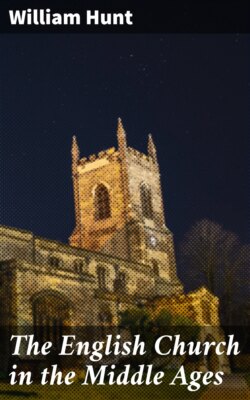Читать книгу The English Church in the Middle Ages - William Morris Hunt - Страница 3
На сайте Литреса книга снята с продажи.
PREFACE.
ОглавлениеTable of Contents
This book is intended to illustrate the relations of the English Church with the papacy and with the English State down to the revolt of Wyclif against the abuses which had gathered round the ecclesiastical system of the Middle Ages, and the Great Schism in the papacy which materially affected the ideas of the whole of Western Christendom. It was thought expedient to deal with these subjects in a narrative form, and some gaps have therefore had to be filled up, and some links supplied. This has been done as far as possible by notices of matters which bear on the moral condition of the Church, and serve to show how far it was qualified at various periods to be the example and instructor of the nation. No attempt, however, has been made to write a complete history on a small scale, and I have designedly passed by many points, in themselves of interest and importance, in order to give as much space as might be to my proper subjects. Besides, this volume has been written as one of a series in which the missions to the Teutonic peoples, the various aspects of Monasticism, the question of Investitures, and the place which the University of Oxford fills in our Church’s history have been, or will be, treated separately. Accordingly I have not touched on any of these things further than seemed absolutely necessary.
I wish that, limited as my task has been, I could believe that it has been adequately performed. No one can understand the character, or appreciate the claims, of the English Church who has not studied its history from the beginning, and it is hoped that this little book may do something, however small, towards spreading a correct idea of the part that the Church has borne in the progress of the nation, and of the grounds on which its members maintain that it has from the first been a National Church, as regards its inherent life and independent attitude as well as its intimate and peculiar relations with the State. A firm grasp of the position it held during the Middle Ages is necessary to a right understanding of the final rupture with Rome accomplished in the sixteenth century, and will afford a complete safeguard against the vulgar error of regarding the Church as a creation of the State, an institution established by the civil power, and maintained by its bounty. Those who are acquainted with our mediæval chroniclers will see that I have written from original sources. I have also freely availed myself of the labours of others, and, above all, of the works of Bishop Stubbs, which have been of the greatest assistance to me.
